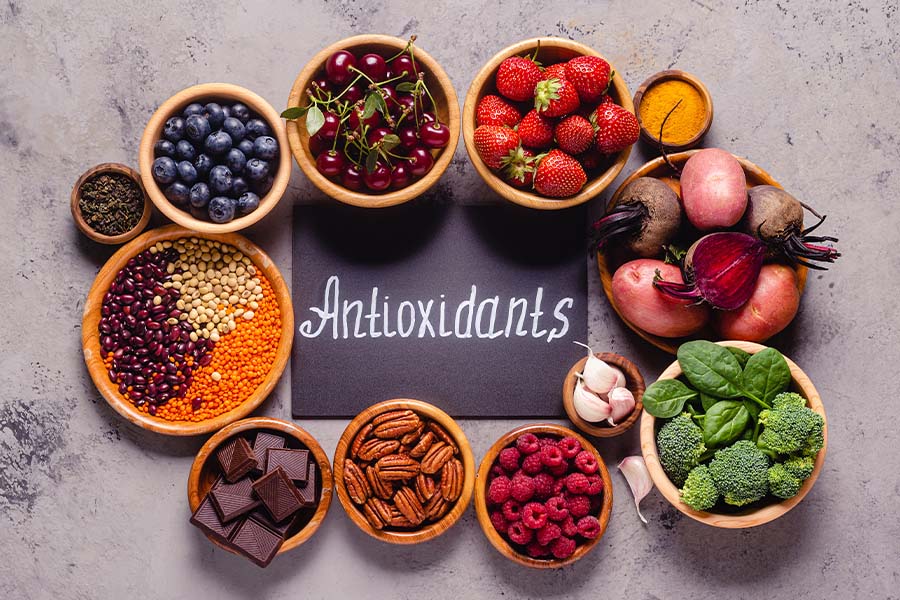Ever wonder what's happening inside our bodies as we navigate the pollution, stress, and sun rays of everyday life? It's a showdown between free radicals and our cells! Picture these unstable, oxygen-craving rogues wreaking havoc on our cellular structures, swiping electrons left and right, leaving destruction and chaos in their wake.
Now, our body can handle a few of these naughty molecules and even needs them for daily functions. But when there are too many troublemakers, things can get ugly - irreversible damage can occur, and our body may develop diseases or even some nasty cancers.
So, remember to take care of your body, avoid those pesky free radicals when you can, and watch out for the silent cellular skirmish within!
What Are Antioxidants
Ever heard of cellular superheroes? Antioxidants are just that! These mighty molecules swoop in to save your cells from the havoc-wreaking villains, aka free radicals, born from life's daily hustles. You can consider antioxidants the spunky sidekicks your body needs as they are "Free-Radical Wranglers."
These mighty warriors can be found hanging out in certain foods, ready to combat damage caused by free radicals. You can watch for their multivitamin team members, vitamins A, C, and E, and the trusty sidekicks copper, zinc, and selenium!
But hang on - there's a twist! The most potent antioxidants may not even be a part of the nutrient squad. Enter our mysterious strangers, the non-nutrient antioxidants. These undercover agents, like Lycopene from tomatoes and Anthocyanin from cranberries, pack an even mightier antioxidant punch.
So you can indulge in their delicious crime-fighting powers and give those villainous free radicals the boot! Since antioxidants are found in both natural states and in the form of supplements. You can consume antioxidant supplements like antioxidant pills since they can provide a lot of benefits to the body.
Related Article: Vitamins and Minerals: What Are They & Why Should I Care?
Effects of Free Radicals
Free radicals can cause more than wrinkles and gray hair - they're also responsible for various ailments, such as vision loss, joint inflammation (arthritis), neurological diseases like Parkinson's and Alzheimer's, accelerated aging processes, and heart disease.
Even some cancers are linked to the damage free-range delinquents do to cell DNA! Although taking some supplements like adaptogen assist and ashwagandha root may help improve some these issues, taking antioxidant supplements may also be of great benefit. Always remember to consult your health care team before adding any new supplements into your diet.
Related Article: 5 Risk Factors of Cardiovascular Diseases & How to Prevent It
Antioxidants Benefits
You can feel invincible against diseases by embracing the superhero powers of antioxidants! These mighty disease fighters can swoop in to save the day, blasting away those pesky free radicals and defending your body against oxidation damage.
And guess what? Research from around the globe continuously unearths new possibilities for their defensive prowess. Take Lycopene, a heavyweight hero in vibrant red fruits and veggies like tomatoes, apricots, pink grapefruit, and watermelon.
Not only has this fantastic antioxidant been linked to cutting off prostate cancer in the past, but it's also been seen helping prevent type 2 diabetes mellitus! So load up on antioxidants, and make your body an impenetrable fortress against the disease!
Research supports that munching on spinach and corn, rich in the wonder nutrient Lutein, can help keep your mind sharp and agile as you embrace your golden years. So, never underestimate the power of these unassuming veggies; they're fighting age-related vision loss and memory lapses, one delicious bite at a time!
More good news is that eating scrumptious goodies like apples, grapes, and citrus fruits - alongside delightful berry treats - can ward off pesky ailments like metabolic disorders and the big "C" (that's cancer, folks).
Natural Antioxidants
Feast your cells on antioxidant-packed plant foods! Dive into a colorful assortment of fruits and veggies, dabble in nuts and whole grains, and get a sneaky dose from some meats, poultry, and fish. Wholesome and lively - that's how we roll!
Beneficial sources of certain natural antioxidants include:
- Leeks, onions, and garlic have allium sulfur compounds, while eggplant, grapes, and berries contain anthocyanins.
- Copper is found in shellfish, lean meat, milk, and nuts.
- Beta-carotene is found in pumpkins, mangoes, apricots, carrots, spinach, and parsley.
- Catechins are found in red wine and tea.
- Red capsicum, pumpkin, and mangoes all contain cryptoxanthins.
- Tea, green tea, citrus fruits, red wine, onions, and apples all contain flavonoids.
- Cruciferous vegetables, including broccoli, cabbage, and cauliflower, contain indoles.
- Soybeans, tofu, lentils, peas, and milk contain isoflavonoids.
- Sesame seeds, grains, and vegetables all contain lignans.
- Green leafy vegetables like spinach and corn are high in Lutein.
- Shellfish, lean meat, milk, and nuts all contain manganese.
- Herb polyphenols, lean meat, seafood, offal, whole grains, selenium liver, sweet potatoes, carrots, milk, and egg yolks all contain vitamin A.
- Oranges, blackberries, kiwi fruit, mangoes, broccoli, spinach, capsicum, and strawberries are foods high in vitamin C.
- Avocados, nuts, seeds, whole grains, and vegetable oils (such as wheat germ oil) are all sources of vitamin E.
- Fish, lean meat, milk, and nuts all contain zinc.
Dietary Recommendations for Antioxidants
If you are feeling puzzled about antioxidants? You're not alone! The smarty-pants researchers can't agree if antioxidant supplements pack the same health punch as the real deal in foods. Worry not, for a balanced diet comes to the rescue! Spice up every meal with a colorful mix of these fab-five food groups - an authentic recipe for wellness:
- Two scoops of veggies, legumes, or beans (extra points for rainbow shades!).
- Fruit for a naturally sweet treat.
- Whole grains to keep things wholesome.
- Lean and mean protein-lovers club: think meat, poultry, fish, eggs, tofu, legumes, nuts, and seeds.
- Say cheese (the reduced-fat variety, please!) with dairy and its alternatives.
Why not dazzle your body with vitamins and minerals? Let's make it a daily date with a piece of fruit or a half-cup of veg! Remember, size matters - so tailor that serving to your gender, age, and life stage. Bon appetit!
Knowing what's best for you and your particular lifestyle can be daunting with many dietary choices. But according to the American Dietary Guidelines, there are recommended servings and portions corresponding with age, life stage, or gender - providing just enough insight into how we should shape our diets!
Adding nutrients from veggies & legumes gives us an extra antioxidant boost - but if in doubt, always consult a trusted professional (your doctor or dietitian!)
Effect of Cooking on Antioxidants
Do you know that cooking can be a wild ride for our antioxidants? For instance, when you turn up the heat on tomatoes, their lycopene superhero gets a power boost, making it even easier for our bodies to absorb. But it's not all sunshine and rainbows - veggies like cauliflower, peas, and zucchini can lose their antioxidant when cooked.
Remember, variety is the spice of life, so mix it with antioxidant-rich foods, from raw to well-done.
Dietary Tip
So, here are a few pro tips to boost your antioxidant game:
- Add fruity or veggie flair to every meal or snack - they deserve the spotlight!
- Channel your inner zen master with a daily cup of green or matcha tea.
- Color your plate with vibrant, antioxidant-rich superstars like kale, beets, and berries. Say goodbye to dull, beige meals!
- Turn up the flavor and antioxidants in your dishes with exotic spices like turmeric, cumin, oregano, ginger, clove, and cinnamon.
- Snack like a pro! Munch on nuts, seeds, and dried fruits (sans added sugar or salt). Brazil nuts and sunflower seeds are where it's at!
Risks
Are you feeling like you want antioxidants to boost your health? Hang on to your salads, folks! Although devouring fruits and veggies is linked to tip-top health, the jury's still out on antioxidants being the star players. And before you pop those supplement pills, approach you health care provider because it's better to be safe than sorry!
FAQs
1. Are antioxidants good for you?
Yes, antioxidants are beneficial for humans. Antioxidants act as a defense against oxidative stress, an imbalance between producing reactive oxygen species and the body's detoxification ability. Antioxidants help reduce damage caused by oxidative stress, which can lead to health issues such as inflammation, heart disease, and cancer. Additionally, antioxidants can help reduce the risk of age-related diseases and neurological disorders.
2. How do antioxidants work?
Antioxidants work by neutralizing free radicals, which are molecules that can cause damage to cells in the body. Antioxidants donate electrons to the free radicals, stabilizing them and preventing them from causing damage. By neutralizing free radicals, antioxidants help protect the body from damage caused by oxidative stress, a condition caused by an imbalance of free radicals and antioxidants.
3. Mention a few examples of antioxidants.
Some of the most common examples include Vitamin A, found in carrots, sweet potatoes, and dark leafy greens like kale; Vitamin C - found in citrus fruits such as oranges and lemons; Vitamin E - found in vegetable oils such as sunflower oil or wheat germ oil; Polyphenols - found in apples, green tea, and cocoa; Carotenoids - found in yellow/orange vegetables like squash or tomatoes. Lycopene - a carotenoid mainly present in red-colored foods such as watermelon and pink grapefruit.
4. What Is the number one antioxidant?
One of the best food sources of antioxidants is in blueberries. They are abundant in anthocyanins and other antioxidants that may help lower the risk of heart disease and postpone the aging-related loss in brain function.
The Bottom Line
In summary, antioxidants act as brave little soldiers, valiantly defending your body from the pesky invaders known as free radicals. With an arsenal sourced from delicious fruits, veggies, nuts, and grains, these molecular warriors also call upon vitamins and minerals like A, C, E, copper, zinc, and selenium for backup. These antioxidant powerhouses wage war against health enemies that lead to vision loss and cardiovascular diseases while researchers continue to discover new ways these fearless fighters save the day. So, dazzle your body with a health party by feasting on two hefty handfuls of veggie delights, fruit medleys that'll make you swoon, whole grains that groove, lean protein with a mean dance step, and sassy reduced-fat dairy alternatives. You can adjust your menu according to your health and lifestyle.
Reading List
Article Sources
- Thapar, Parul. "Health Nutrients for Healthy Eyes." SR Vol.52(08) [August 2015], Aug. 2015. nopr.niscpr.res.in, http://nopr.niscpr.res.in/handle/123456789/31916.
- Deutsch, Jonathan, et al. "Chapter Fourteen - Not Rocket Science but Grandmother Wisdom: Real Food Alternatives to Oral Nutrition Supplements." Transdisciplinary Case Studies on Design for Food and Sustainability, edited by Sonia Massari, Woodhead Publishing, 2021, pp. 233-47. ScienceDirect, https://doi.org/10.1016/B978-0-12-817821-8.00007-2








